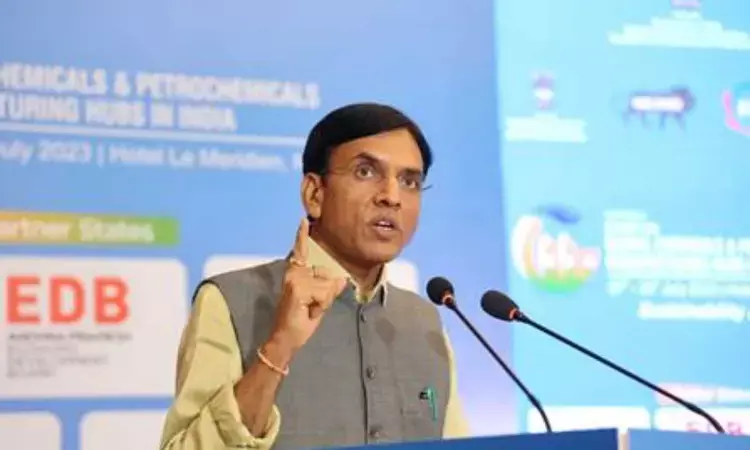- Home
- Medical news & Guidelines
- Anesthesiology
- Cardiology and CTVS
- Critical Care
- Dentistry
- Dermatology
- Diabetes and Endocrinology
- ENT
- Gastroenterology
- Medicine
- Nephrology
- Neurology
- Obstretics-Gynaecology
- Oncology
- Ophthalmology
- Orthopaedics
- Pediatrics-Neonatology
- Psychiatry
- Pulmonology
- Radiology
- Surgery
- Urology
- Laboratory Medicine
- Diet
- Nursing
- Paramedical
- Physiotherapy
- Health news
- Fact Check
- Bone Health Fact Check
- Brain Health Fact Check
- Cancer Related Fact Check
- Child Care Fact Check
- Dental and oral health fact check
- Diabetes and metabolic health fact check
- Diet and Nutrition Fact Check
- Eye and ENT Care Fact Check
- Fitness fact check
- Gut health fact check
- Heart health fact check
- Kidney health fact check
- Medical education fact check
- Men's health fact check
- Respiratory fact check
- Skin and hair care fact check
- Vaccine and Immunization fact check
- Women's health fact check
- AYUSH
- State News
- Andaman and Nicobar Islands
- Andhra Pradesh
- Arunachal Pradesh
- Assam
- Bihar
- Chandigarh
- Chattisgarh
- Dadra and Nagar Haveli
- Daman and Diu
- Delhi
- Goa
- Gujarat
- Haryana
- Himachal Pradesh
- Jammu & Kashmir
- Jharkhand
- Karnataka
- Kerala
- Ladakh
- Lakshadweep
- Madhya Pradesh
- Maharashtra
- Manipur
- Meghalaya
- Mizoram
- Nagaland
- Odisha
- Puducherry
- Punjab
- Rajasthan
- Sikkim
- Tamil Nadu
- Telangana
- Tripura
- Uttar Pradesh
- Uttrakhand
- West Bengal
- Medical Education
- Industry
India has started manufacturing 38 APIs in past 1.5 years: Union Health Minister

The government has announced a Rs 15,000 crore PLI scheme for the pharmaceutical sector, he said.
New Delhi: India has started manufacturing 38 active pharmaceutical ingredients, or APIs, in the last one and a half years on which it was import-dependent, under the production-linked incentive scheme for the sector, Union Health Minister Mansukh Mandaviya said.
Mandaviya said that the 2017 border standoff with China at Doklam triggered India to rethink its self-reliant strategy regarding active pharma components as it was dependent on just one country for the import of 95% of APIs for the formulation industry.
The health minister was speaking at the inaugural event of the Healthcare Summit organised at the Indian Institute of Management Ahmedabad.
“Through the PLI scheme, we tried to ensure that the country does not have to import 54 APIs from abroad and our formulation industry gets APIs domestically. I am happy to share that in just a year and a half, India has started manufacturing 38 APIs, which is an example of Atmanirbhar Bharat,” he said.
The government has announced a Rs 15,000-crore PLI scheme for the pharmaceutical sector, he said.
The first priority for this government to make healthcare accessible and affordable in rural areas was to address the requirement of doctors, he said.
“In the last nine years, the number of MBBS seats has increased from 52,000 to 1,07,000. This year, we have given approval to 54 new medical colleges,” Mandaviya said.
The Minister of Health and Family Welfare and Chemicals and Fertilizers said Covid-19 pandemic inspired them for rethinking, replanning and redevelopment in the healthcare sector.
“There was never a shortage of brainpower and manpower in India. The thing is to understand the dreams in the eyes of the youth and open pathways and identify opportunities to make them fulfil,” he said.
The minister said research and innovation is the biggest requirement for the country.
“Lack of innovation and research negatively impacts Atmanirbharta (self-reliance). If we do not have our own research, we cannot fulfil our requirements on time and will be forced to purchase items at a higher price,” he said, adding that his government has taken steps to encourage private domestic pharma companies to increase spending on R&D.
IIMA chairman Pankaj Patel and director Bharat Bhasker were also present at the event organised by the premier institute’s Centre of Management of Health Services and IIMA Healthcare Alumni Special Interest Group.
The summit featured two tracks, each focused on a crucial aspect of healthcare innovation, with panel discussions and competition for healthcare start-ups.
Read also: No nationwide shortage of HIV drug Dolutegravir: Mansukh Mandaviya


